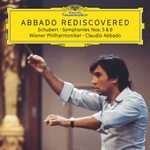|
Back
12/12/2018
“Abbado Rediscovered”
Franz Schubert: Symphony n° 5 in B-Flat major, D.485 – Symphony n° 8 in B minor “Unfinished”, D.759
Wiener Philharmoniker, Claudio Abbado (conductor)
Live recording: Musikverein, Grosser Saal, Vienna, Austria (May 31, 1971) – 55’06
Deutsche Grammophon #0289 483 5620 1 – Booklet in English, German and Italian

   
Every generation of musicians and music lovers inevitably assess a classical composer’s importance in the musical universe, lest they had been overlooked for being ahead of their time or perhaps innovative in ways that were not fully understood in their own era. Franz Schubert’s symphonies, for instance, stood the shadow of Beethoven’s, never mind that Schubert produced nine symphonies before he died in 1828, at age 31. He also composed as the Classical Era was giving way to the Romantic Era. In this century there has been renewed respect for Schubert’s symphonies, and ahead of that curve was conductor Claudio Abbado.
The compositional depth and the clarity in which Abbado interpreted Schubert’s symphonies is fully present on “Abbado Rediscovered.” This is a previously unreleased live recording of Abbado conducting the Wiener Philharmoniker for Schubert’s Symphony n° 5 and n° 8 in 1971 at Vienna’s Musikverein, Grosser Saal. The pristine acoustical quality of this recording, for starters, is simply stunning as it captures this orchestra at the height of their technical artistry. There is also a kinetic acoustical quality that is so often missing in studio recordings – the mystical energy in the concert hall.
Fittingly, the CD booklet lists all of the Wiener musicians who played in this performance, and this is an ensemble with such control and so musically “in the moment” with Abbado and, indeed, with Schubert’s compositional vision. Abbado’s and the Wiener Philharmoniker’s clarity in realizing all of this musicality in this performance is breathtaking.
Schubert was obsessed with Mozart later in his short life, and the opening “Allegro” in Symphony n° 5 is imbued with Mozart-esque esprit and ennui…undoubtedly an homage. Just as Beethoven is cited for musically conjuring great philosophical questions, the Symphony n° 5 also conjures a gravitas that comes to mind in Abbado’s rendering of Schubert’s powerful orchestral narrative.
The surge of the combined strings in Schubert’s great “Unfinished” Symphony n° 8 is like a slow-moving sonic force that overtakes the senses and just goes through one’s body. Abbado detailed all of its orchestral drama, but also elicited the full dimension of Schubert’s protean symphonic vision. In 1971 Abbado was at the height of his powers with the Vienna Philharmonic, and he was musical director at La Scala and the vanguard conductor of the Salzburg Festival.
Reflecting on the importance of this Schubert performance, Professor Dr. Clemens Hellsberg, longtime violinist for the Vienna State Opera Orchestra, writes in the liner notes that “moments in a performance when time seems to stand still, moments that allow us a glimpse of the infinite.” Indeed, there are such moments listening to this recording.
The only disappointment in this recording is that the third work on the program that day in May was Béla Bartók’s Piano Concerto n° 2 performed by Maurizio Pollini which is not included on this recording. Be that as it may, the Schubert symphonies make this something that belongs in every classical library.
In the recording’s liner notes, Wolfgang Stähr also writes of Abbado commenting in 2013, just months before his 80th birthday, about listening to an old recording that “Sometimes they are not bad, sometimes they are terrible.” Stähr reports that Austrian Radio recorded this concert, but it remained in their archives until it was unearthed for the orchestra’s 175th anniversary and “has long since acquired the status of a historical document.” One wonders what Abbado would say about this live recording? For the rest of us, it is an obvious priceless musical treasure.
Lewis J. Whittington
|